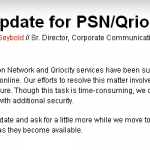Weekly News Roundup (24 April 2011)
No luck with waiting for leaks of NPD data, so I can continue with the NPD analysis, so it looks like that’s the end of that feature, which has been going on for more than two years already. Instead, I think what I will do is to combine the feature with the WNR, and just post whatever stats I can find in the gaming section below, starting with this issue. It appears the analysts that usually leak data has been warned, legally, not to do so by the NPD, who themselves are probably under pressure from certain gaming companies, which shall remain unnamed, that are often too ashamed of their sales results and don’t want the negative publicity.
Not too many interesting news stories this week, thanks to Easter I suppose, so let’s get started.
 In copyright news, critics of the DMCA and harsher copyright laws have often warned that they can be used to prevent freedom of speech, and this week, we have a story that seems to perfectly illustrate the dangers of giving too much power to copyright holders.
In copyright news, critics of the DMCA and harsher copyright laws have often warned that they can be used to prevent freedom of speech, and this week, we have a story that seems to perfectly illustrate the dangers of giving too much power to copyright holders.

Doctored Reviews: A new website to help fight the practice of using the DMCA to remove bad doctor reviews
Apparently, there’s a company going around removing bad reviews of doctors written by their patients. The company, Medical Justice, provide the service to doctors that are concerned about their reputations being tarnished online, whether justly or unjustly. Doctors can force patients to sign an agreement prior to receiving medical care, and this agreement actually hands over copyright of the patient’s reviews over to Medical Justice, allowing the DMCA to be later used to remove bad reviews. Obviously, this is quite an underhanded practice, and it’s probably a good thing that certain websites now maintain a list of doctors that use the service of Medical Justice, as you can just refer to that list, assume these are all bad doctors, and *avoid* them. And many doctor review sites now ignore DMCA take-down requests of bad reviews, preferring to take this matter to court if necessary, and a couple of UCLA law professors have even set up a new website, Doctored Reviews, with the aim of publishing bad reviews of doctors that Medical Justice wants removed, probably hoping the matter goes to court. This is really only the latest example of copyright laws being abused this way, and if governments around the world continue to pander to the copyright lobby, then there will be more and more such cases in the future. Imagine buying a PC game, you agree to the EULA as you would normally do, except in the 200 page document you just agreed to, there’s a provision saying you hand over all online reviews of this game to the publisher, and this means they can use the DMCA to silence anyone who says a bad thing about the game. Nobody should be able to take away your rights so easily, which in my opinion, is a form of copyright infringement as well. And nobody should be able to use the DMCA or other copyright laws to settle non copyright related issues. But if governments are still intent on handing over *your* rights over to corporations, then there’s not much we can do.
The latest country to do is New Zealand, having rushed through legislation without much debate (seems to be a trend these days in relation to copyright laws, from the rushed Digital Economy Act in the UK, to the secretive ACTA discussions) to please the copyright lobby, lobbies that mostly represent non New Zealand interests. The latest story is actually about Anonymous’ plans to attack NZ government websites, but the bigger story is about the new copyright laws and how unbalance they can be. For example, the laws make owners of connections responsible for copyright infringement, something the entertainment industry has been pushing for. You see, it’s hard, if not impossible, to go after the person that actually committed the “crime”, because you would actually needs things like evidence. It’s like if a car was stolen to rob a bank, it’s would be far too hard to actually catch the people that stole the car and robbed the bank, so the police can make it easy on themselves by arresting the owner of the car. Hyperbole aside, the real implication of these ill thought out changes means the end of public Wi-Fi networks in New Zealand. So no more free Wi-Fi at McDonalds unless the fast food joint wants to accept responsibility for pirated downloads. Innovation and competition, has given away to protectionism of an industry that is trying so hard to avoid innovation and competition.
This is just the latest trend in copyright laws that goes against everything a democratic and lawful society is supposed to stand for. The over-exaggeration of the piracy problem by copyright lobby is directly responsible for these over-exaggerated responses by clueless governments being led down the wrong path by the smell of lobbying cash. And I’m convinced the copyright problem, much like every other problem, cannot be addressed until the root causes can be identified, and this starts with real stats and figures on the cost piracy, not “estimates” of “potential” losses (which mostly assume the cost of piracy equals the number of pirated items times the full retail cost of said item). Once we have a real understanding of the scale of the problem, we might then decide that enforcement in all but the most extreme copyright cases might not be in the public interest at all, due to the financial cost of it all. But if there is a substantial problem related to piracy, then no matter how serious the problem is, one should not have to sacrifice the basic tenets of society just to make the problem go away – the ends do not justify the means, especially when the “ends” is not even certain. Innocent until *proven* guilty, with the copyright holders responsible for having to proof that copyright infringement has occurred, and also to proof the extent of actual monetary damage. And they should have to do it in a court, with full rights of appeal for the alleged offender. We’re often told that piracy is just like stealing a car, but the problem is that car thieves actually have more rights than a downloader when it comes to copyright laws of countries like the UK and France, and now New Zealand. With a car theft, first of all, there is conclusive proof of material loss or damage, and then the police have to proof, beyond a reasonable doubt, who actually stole the car, arrest them, and then a judge decides the verdict, with the offender given full rights to argue his or her case, and then to appeal if needed. With downloads, the “victim” is the judge, the jury, and in some cases, the executioner (or at least they organize the execution, by forcing ISPs to act), and all before actual damages have even been proved. The argument is that proofing all of this is too hard, too time consuming, but when is taking shortcuts when justice is concerned ever the right thing to do? Anyone who wants to subvert justice this way should be considered an enemy of the state, an enemy of the people, but it’s the opposite right now, and so it’s no wonder you’ve got movements like Anonymous taking action against what they, and many of us, perceive to be an attack on our freedoms.

The week ending 2nd April proved to be a milestone of sorts for Blu-ray, except it turns out the week after was even more, um, “milestonie”. Blu-ray finally broke through the 24% market share record, and the week after, it broke through the 25% as well (I still need to post up the analysis for that week, when it’s up, it will be on this page).
Unfortunately, combined revenue, of both DVD and Blu-ray sales, is actually quite disappointing. This is mainly because DVD sales continue to fall, quite dramatically at times, and the increase in Blu-ray sales haven’t really been enough to even slightly offset losses. It’s no good having $20 million increases in Blu-ray sales, when DVD losses are $100 million or more. The economy probably has a lot to do with it, and perhaps it just shows people are buying a smaller number of better and more expensive products (eg. Blu-ray), but buying less overall. Perhaps they’re turning to piracy, since you can only buy what you can afford. Maybe they’ve turned to digital distribution, Netflix and the like, or cheaper rentals via Redbox. Or maybe they’ve just stopped watching. It’s not as if there’s a dearth of free, legal, entertainment these days – just the free apps on smartphones can occupy someone for ages.
Which is why, as reported by one of our new news contributors, the Harry Potter and the Deathly Hallows Part 1 Blu-ray and DVD situation is so frustrating and unhelpful in the current climate. Not only are there 5 editions of the same movie across the two formats, two of the editions are exclusive to two different stores. And while Warner Bros may have maximized their revenue potential by signing lucrative exclusivity deals, it’s the consumer that ends up having less choice in terms of where to purchase, and more confusion as to which version to buy. I’ve always respected WB for being pioneers in adopting new video formats, they were one of the very few to support VCD, and a major backer behind HD DVD before they decided to abandon the format, and they also abandoned region coding for Blu-ray. But they botched the Lord of the Rings theatrical release, want to make us sextuple dip the LOTR franchise, and will probably do something similar with the HP franchise as well. But it’s their right, and it’s our right to not get sucked in and do more research before parting with our cash, that is if we decide to part with it at all.
![]()
And finally in gaming, the story that everyone is talking about this week has to be the downing of the PlayStation network, which appears to be still down as I write. Of course, everyone pointed the finger at Anonymous, but group has said that they didn’t do it, or at least it wasn’t an official “op”.

The PlayStation Network has been down for the last few days, Sony says "external intrusions" are responsible
And with Sony being their usual selves when it comes to being transparent, there’s not a lot of information about just what went wrong, and what is being done to fix the problem. Speculating blindly, I think this is probably more hacking than denial-of-service. It doesn’t look like a DDoS, the traditional attack method of Anyonmous, because first of all, those are quite easy to stop, certainly would not take two or more days, and it would also mean completely dis-connectivity, but there are reports that people’s queued downloads are still downloading fine. So it looks like hacking, probably a security exploit that someone took advantage of and managed to get deep into the PSN infrastructure. The subsequent fixes to ensure whatever exploit is patched is probably what’s taking so long, so it looks like quite a serious, structural problem.
Now, you can blame the hackers, but just like with the PS3 hack, nobody could have done a thing to it if the exploit was not there in the first place, and exploit and weakness present due to programming errors on Sony’s part. Same with the PSN. The hackers may have tore your house down, but they wouldn’t have been able to so if it wasn’t made of straw, if you know what I mean. So Sony are ultimately responsible, and that’s the way it should be. However, since PSN is mostly a free service, nobody can complain really. Only those that paid for the PSN Plus should demand some kind of compensation, as would Xbox Live Gold users if XBL Gold ever went down for such a long time.
Anyway, it’s the last thing Sony needs, having come last again in last month’s US console sales. I’m going to assume this because otherwise Sony would have touted the fact that they beat the Wii, which sold just above 290,000 units (down 47% compared to March 2010) according to Nintendo. Microsoft did release the sales figures, mainly because they’re not ashamed of having come last I suppose, and with 433,000 (up 28% compared to March 2010), the Xbox 360 was once again the best selling home based console for March 2011, in the US. Only Sony knows just how bad the PS3 results were, although they did say that the PlayStation platform overall sales rose “double digits” compared to a year ago. This could mean anything though, especially with the PSP price drop, and again, I point to Sony not making a big deal of outselling the poor performing Wii as evidence of the PS3’s poor performance in March. And if that’s the case, the the PS3 re-starts its recent trend of sales declines compared to the same month last year, having had a pause in February. And recent events won’t have helped PS3 sales in April, I bet, but we may never find out.
So that’s it for the week, and for this very much abridged version of the monthly NPD analysis. See you next week.


April 16th, 2012 at 11:53 am
[…] so the figures for US sales in February 2012 are below, ranked in order of number of sales (March 2011 figures also shown when available, including percentage […]